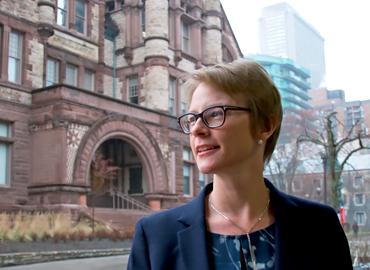Preserving history through dissident literature — Ann Komaromi explores Russia’s underground publishing network
March 9, 2023 by Sean McNeely – A&S News
While the world continues to watch the war in Ukraine and witnesses the exchange of bombs and gunfire, Ann Komaromi is involved in the exchange of underground journalism and literature.
Komaromi, an associate professor the Faculty of Arts & Science’s Department of Slavic Languages & Literatures and the director of the Centre for Comparative Literature, is fascinated with alternative publishing, underground networks and nonconformist literature and art in the Soviet Union.
That’s led to her being involved with the Nobel Peace Prize-winning human rights organization, Memorial, for more than 20 years.
Memorial was founded in Russia during the fall of the Soviet Union to collect facts about repressions and civil society activity under Joseph Stalin’s reign (1924-1953) and after.






